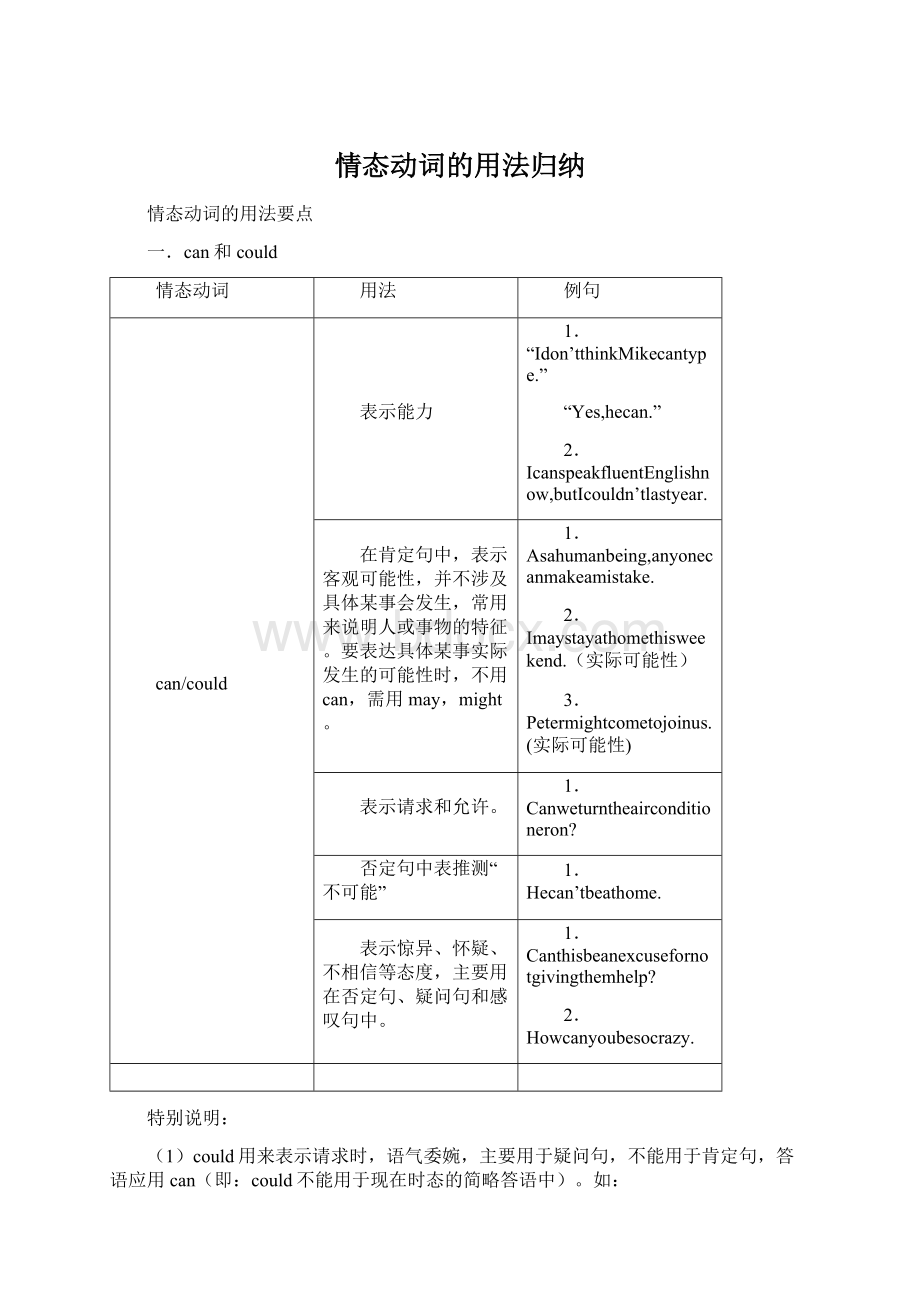情态动词的用法归纳Word下载.docx
《情态动词的用法归纳Word下载.docx》由会员分享,可在线阅读,更多相关《情态动词的用法归纳Word下载.docx(11页珍藏版)》请在冰豆网上搜索。

(1)could用来表示请求时,语气委婉,主要用于疑问句,不能用于肯定句,答语应用can(即:
could不能用于现在时态的简略答语中)。
如:
——CouldIuseyourdictionary?
——Yes,youcan.(否定回答可用:
No,I’mafraidnot.)
(2)can和beableto辨析
can(could)和beableto都可以表示能力,意思上没有区别。
但can只有现在式和过去式,而beableto则有更多的形式。
I’vealwayswantedtoabletospeakfluentEnglish.
Thosebagslookreallyheavy,areyousureyou’llbeabletocarrythemonyourown?
但是,表示在过去某时的某一场合经过一番努力,终于做成了某事,通常不用could,而用was/wereableto来表示。
这时,was/wereableto相当于managedtodo或succeedindoing。
Aftertheaccidentitwasalongtimebeforeshewasabletowalkagain.
Thefirewasverybig,butmostpeoplewereabletoescapefromthebuilding.
(3)惯用形式“cannot…too…”表示“无论怎么……也不(过分)”。
Youcannotbetoocareful.你越小心越好。
惯用形式“cannotbut+不定式(不带to)”表示“不得不,只好”。
Icannotbutadmireherdetermination.我不得不钦佩你的决心。
二.may和might
may/might
表示允许、许可。
否定回答一般用mustnot/mustn’t,表示“禁止、阻止”之意,但也可以用hadbetternot(最好别)或maynot(不可以),语气较为委婉。
1.MayIcomeinandwait?
2.——MayIsmokehere?
——No,youmustn’t(或No,you’dbetternot.)
表示请求、允许时,
1.MayIborrowyourpen?
表示可能性的推测,通常用在肯定句和否定句中,含有“或许”“大概”“可能”之意;
1.Itmayrainthisafternoon.
2.Shemaynotbeathome.
may用于祈使句表示祝愿
1.Mayyousucceed.
2.Longmayhelive!
愿他能持续住下去。
3.Mayyouhavemanymoredaysashappyasthisone.
4.Maysherestinpeace.愿她安息。
惯用句式:
“mayaswell或might(just)aswell+动词原形”意为“最好,满可以,倒不如”,相当于“hadbetter或thereisnoreasontodoanythingelse.
1.Thereisnothingtodo,soImayaswellgotobed.
二.must和haveto
must
1.表示“必须,应该”之意,语气比should,oughtto强烈。
其否定形式mustn’t表示“不准,不应该,禁止”等意
1.Youmustcometoschoolontime.
2.Youmustn’tdrivesofastinthestreet.
在回答带有must的问句时,否定回答常用needn’t或don’thaveto,表示“不必”,而不用mustn’t
1.—MustIcomebackbeforeten?
—Yes,youmust.(No,youneedn’t)
2.表示有把握的推测,意为“一定、准是、相必”,只用于肯定句中.
1.Itmustbemymother
3.表示固执己见,“一定”。
2.Ifyoumust,Iwilltellyou.
haveto
“必须,不得不”,意义与must相近。
但must表示的是说话人的主观看法,而haveto则往往强调客观需要。
1.Thefilmisnotinteresting.Ireallymustgonow.
2.Ihavetogonow,becausemymotherisinhospital.
must只有一种形式,即现在式与过去式都是一种形式,而haveto则涉及各种人称、时态等方面的变化形式。
1.IhadtoworkhardwhenIwasyourage.
2.Iwillhavetolearnhowtouseacomputer.
3.Inordertotaketheexam,we’llhavetofinishthewholebookbytheendofthismonth.
两者的否定意义不同,mustn’t表示“禁止,不许”,don’thaveto表示不必。
1.Youmustn’tgothere.
2.Youdon’thavetogothere.
四.shall和should
shall
用于第一人称构成的疑问句,表示征求对方意见或请求指示
1.ShallIopenthewindow?
2.Shallwesay6o’clock,then?
3.WhatshallIgetfordinner?
用于第二、三人称陈述句中,表示说话人给对方的命令、警告、允诺或威胁。
1.Don’tworry,youshallgettheanswerthisafternoon.(允诺)
2.Heshallbesorryforitoneday,Itellyou.(警告)
3.YoushalldoasIsay.(命令)
4.Ifyouchildrendon’tdoasItellyou,youshallnotgototheparty.(威胁)
should
表示劝告或建议,意为“应该”
1.Youshouldreadhisnewbook.
表示推测,用在肯定句中,对现在的情况或可能发生
的事的主观推测或期待。
意为“想必,大概,或许”
1.Itshouldbeanicedaytomorrow.
2.TryphoningRobert,heshouldbehomenow.
3.Heshouldbearoundsixtyyearsold.
还可以用在if引导的条件句中,表示一件事听起来可能性很小,但也不是完全不可能,相当于“万一”的意思。
从句谓语用should+动词原形构成,主句都一定用虚拟语气
1.AskTomtoringmeupifyoushouldseehim.(你万一见到汤姆,请让他给我打个电话)
2.ShouldIbefreetomorrow,I’llcome.(万一我明天有时间,我就过来)
3.Ifthingsshouldchangesuddenly,pleaseletmeknow.(万一情况突变,请通知我)
用于疑问句或感叹句中,表示意外、惊异的情绪,意为“竟会”,与why,what,how,who连用,如果是疑问句,则不需要回答。
1.WhyshouldanyonewanttomarryTony?
2.Don’taskme.HowshouldIknow?
oughttodo
表示“应该”之意
1.Yououghttotakecareofhim.
2.—OughtIgonow?
—Yes,yououghtto./No,yououghtn’tto.
表示推测。
注意与must表示推测是的区别
1.Hemustbehomebynow.(断定他已到家)
2.Heoughttobehomebynow.(不十分肯定)
说明:
should与oughtto表示“应该”时的区别
should表示自己的主观看法,而oughtto的语气中,含有“按道理应该……”之意。
若要反映客观情况或涉及法律义务和规定,一般用oughtto。
Youshouldhelpthemwiththeirwork.
Youarehisfather.Yououghttogethimtoreceivegoodeducation.
五.will和would
will/would
用于表示意志或意愿。
will指现在
1.Heisthemanwhowillgohisownway.(他是个自行其是的人。
)
表示请求、建议等,
1.Willyoupleasetakeamessageforhim?
2.Wouldyoupleasetellmeyourtelephonenumber?
表示习惯或倾向,意为“总是,惯于”。
will至现在,would指过去。
1.Fishwilldiewithoutwater.
2.Peoplewilltalk.(人们总会说闲话。
表示推测,意为“很可能,大概”。
will表示推测比should把握大,比must把握小。
1.Thesethingswillhappen.
2.Thatwillbethemessengerringing.
表示功能,意为“能,行”。
惯用形式:
willdo/woulddo表示“解决问题”、“就行”。
1.Eitherpenwilldo.
用于否定句中,意为“不肯”、“不乐意”
1.Iwon’tlistentoyournonsense.
2.NomatterwhatIsaid,hewouldn’tlistentome.
表示说话时临时的决定。
1.Iwillopenthedoor.
would与usedto辨析
would可用来表示过去反复出现的动作,但不能表示过去存在的状态,所以我们不能说:
“shewouldbeaquietgirl.”
另外,would强调过去某种特定情况下的活动,是完全过去的事情,同现在没有联系。
而usedto则着眼于过去和现在的对比,隐含现在已不存在,动作或状态都可表示。
Would可以表示不规则的习惯,usedto则不可。
Heusedtobeanaughtyboyandcausetrouble.
Iusedtogetupatsixinthemorning.
Sometimesshewouldtakeawalkintheneighboringwoods.
Inthosedays,wheneverIhaddifficulties,IwouldgotoMr.Chenforhelp.
六.need和dare
need
用于表示“需要,必要”之意。
做情态动词时,仅用于否定句和疑问句,只有现在时,过去式要用needn'
thave,疑问式用need+人称?
否定式用neednot(即needn'
t),
1.—Needweleavesoon?
—Yes,youmust.(No,youneedn'
t)
2.Youneedn'
thavehurried.
(=Itwasnotnecessaryforyoutohurry,butyoudid).你当时不必这么匆忙。
做实义动词时,其变化与一般的实义动词相同,后接带to的不定式(needdoing=needtobedone),过去式用needed、didyouneed?
和didn'
tneed,肯定式用needs/needed/need,疑问式用do、does、did提问,否定式要在前面加don'
t、doesn'
t、didn'
t
1.Ajoblikenursingneedspatienceandunderstanding.(need+名词,needunderstanding=needtobeunderstood,需要被理解)
2.Heneedstoseeadoctor.(needtodo)
3.Doyoustillneedvolunteerstohelpcleanupaftertheparty?
(needsomebodytodosomething)
4.Theydidn'
tneedtostartsoearly.(donotneedtodo)
dare
用于表示“敢于”之意。
做情态动词,没有人称和数的变化,主要用于否定句、疑问句和条件状语从句中
1.—Dareyoutellherthetruth?
—Yes,Idare./No,Idaren’t.
3.Howdareyouaccusemeoflying!
4.Hedaren’tadmitthis.
用作实义动词时,其变化与一般的实义动词相同。
在肯定句中,dare后接带to的不定式;
否定句中,dare后既可接带to的不定式,也可接不带to的不定式。
1.Onlyafewjournalistsdaredtocoverthestory.
2.Hedoesn’tdare(to)gotherealone.
3.Don’tyoudare(to)touchit?
七.“情态动词+havedone”用法
情态动词+havedone
musthavedone
表示主观上对过去已经发生的行为进行推测,意为“想必,准是,一定做了某事”
1.Shemusthavegonethroughalot.
2.HemusthavevisitedtheWhiteHouseduringhisstayintheUnitedStates.
may/mighthavedone
表示对过去已发生行为的推测,意为“也许/或许已经(没有)……“。
一般用于肯定句或否定句中,不用于疑问句。
用might则表示语气更加不肯定。
1.Youmayhavelearntthenews.
2.Hemaynothaveheardhisnamecalled.
3.SorryI’mlate.Imighthaveturnedoffthealarmclockandgonebacktosleepagain.
can…havedone
cannothavedone
表示对过去发生的行为的怀疑和不肯定,通常用在否定句和疑问句中。
(can换成could时语气委婉)
1.Wherecanshehavegone?
2.Couldhehavedonesuchafoolishthing?
3.Theboycan’thavefinishedreadingthebooksosoonbecauseitisdifficulteventoanadult.
couldhavedone
可用于肯定句中,表示“可能已经……”之意,此外,还可以表示过去能做而没做的事,有一种对过去为付诸实施的事情的惋惜。
1.Hecouldhavekilledhimselfdrivingatadangerousspeed.
2.Youcouldhavebeenmoreconsiderate.
3.Youcouldhavedonebetter,butyouweretoocareless.
mighthavedone
表示“本来可能……,但实际上没有发生的事情”。
另外,还可以表示“本来应该或可以做某事”之意,含有轻微的责备语气。
1.Youshouldnotswiminthatsea.Youmighthavebeeneatenbyashark.
2.Hemighthavegivenhimmorehelp,thoughthewasbusy.
should/oughttohavedone
用于肯定句时,表示本该做某事,而实际上未做;
用于否定句时,则表示不该做的事反而做了。
1.Heshouldhaveknownthatthepolicewouldneverallowthissortofthing.
2.Youshouldn’thavedoneitsocarelessly.
3.Yououghttohavereturnedthebookearlier.
4.Yououghtnottohaverefusedhisoffer.
needn’thavedone
表示做了本来不必去做的事。
注意:
didn’tneedtodo表示“没必要做而实际上也没有做某事”
1.Youneedn’thavewateredtheplants,foritisgoingtorain.
2.Ididn’tneedtobuythedictionary.Ihadacopyathome.